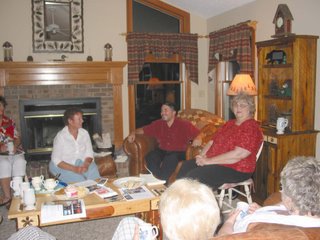
 What’s in Your Back Yard?
What’s in Your Back Yard?
by Aaron Paul Lazar
I’ve had some interesting “lunch walk” partners over the years. When I started engineering at Kodak twenty-five years ago, I found friends who shared my lust for the outdoors – who longed for fresh breezes and blue sky – and who longed to break out of the gray enclave and burst into sunlight in the middle of the workday. We walked regularly, usually for three miles around the perimeter of the dozen buildings that sprawled in a massive complex.
There was Gangaram, my Gujarati friend, who stomped over the grass with certainty, expostulating about family and tradition, and sharing stories of his exotic and colorful childhood in India. He died of a heart attack, fourteen years ago. I still think of him fondly and often recall our deep discussions of fatherhood.
Next came Dave, a true kindred spirit, whose life seemed to parallel mine in the realms of children and reading. Dave’s four daughters were ten years ahead of my three girls, and I learned many lessons in the virtues of patience and quiet endurance during our walks together. He introduced me to Clive Cussler’s Dirk Pitt novels. Dave is retired and now boasts thirteen (or is it fourteen?) grandchildren.
I became attached to my walking buddies over the years. Friendships blossomed and our lives were enriched.
Then, there were the years when I walked alone.
I’ll never forget those walks in the fall of 1997, just after I lost my father. I strode through crunchy leaves and listened to the leaves whispering my name, longing for signs that Dad was okay… that I was okay. Well, I wasn’t. But in time, I forged on and learned to cope with the most powerful loss of my life.
I wrote God-awful poetry after those walks, redolent with lush imagery and emotion that spilled from the pages. Although it wasn’t suitable to publish, it did get my career as a writer kick-started. Soon afterwards, the LeGarde Mystery series was born and it’s still going strong, nine years later.
This year, my lunch walking pal left the company for greener pastures. She landed a sweet job in another state, with a collection of low-cost benefits that are otherworldly-amazing. She’s started her own solo lunch walks around her new complex. Soon, she’ll align with new friends who have the same need to escape to nature for a short while. I accept that this cycle repeats and wish her great success in her new adventures.
In twenty-five years of lunch walks, however, I never knew what lay in my own back yard.
My new walking buddies are adventurous. I call them the Treasure Hunter and the Meanderer. They don’t settle for the same old paths over which I’ve trod for years. They cross the street, duck down barely visible dirt paths, and venture into lands outside the complex. Through these brave pioneering marches into foreign territories, we’ve discovered a lunch walkers’ nirvana.
There, just across the street and not fifty feet from our usual perimeter walk, lay hidden trails that lead to glorious glens, sparkling creeks, and grassy trails lined with woods. For twenty-five years - nearly a thousand walks - I’ve passed this seemingly scrubby area and not given it another thought.
Until last week, when on one of the far-flung adventures, the Meanderer led us to some newly discovered wood trails. I remember the day well. That evening, I was scheduled for a book club event at 6:30 in a nearby library. We passed through cool, glorious woods and broke into the sunlight to follow a dirt track flanked by robotic-looking power lines. Delighted to find such previously hidden treasures, we chatted and laughed our way through patches of Queen Anne’s Lace, purple loosestrife, buttercups, black-eyed Susans, and flowering milkweed. Heading in the direction we hoped was “home,” we stumbled upon a wide creek. The Treasure Hunter pointed out a blue heron taking flight.
In the distance, we heard the sounds of humanity. A metal door clanged shut in a company loading dock. Cars whooshed past on the road we’d originally braved and crossed. We were heading in the right direction.
After tromping through the “wild,” sweaty and tired and ready for the sandwiches that beckoned in the bags on our desks, we had to find a way across the creek. We began to inspect the shore, walking farther down the muddy stream. Although we hoped to find a crossing or a narrow neck of water, we were sunk. There was no way to cross.
Unless…
Our pioneering spirits kicked into overdrive as we searched the nearby woods for dead limbs or tree trunks light enough to carry, but heavy enough to hold our weight. The Meanderer found a balancing pole. I threw the gathered logs across the creek, splattering my blue Dockers with fresh mud. Laughing and feeling deliriously adventurous, I ventured out over the logs.
I set one foot on the slippery log. It sunk into the mud, moistening my walking sneakers. Using the balancing pole, I cat-walked across the creek – until I came to the end of the man made “bridge,” where the grass-filled water looked solid from the opposite bank. Stuck, I forged ahead, sinking up to my ankles in mud.
The tears rolled down our cheeks as we belly laughed, choking and guffawing until we thought we’d lose control. There are no restrooms in newly discovered nirvana. Doubled over and nearly hysterical, we finally stopped to assess the situation.
More logs seemed to solve the problem. I caught and positioned them so my friends could safely avoid the muck.
The Meanderer started across, using the balancing pole carefully. One step. Two.
She’s gonna make it!
Three. Four.
Five, six, seven.
Oops.
On the last step, she lost her balance and stepped into the gooey mess.
Another round of insane laughter. This time, the Treasure Hunter took a turn. Confident she could navigate this last hurdle, she took one step, lost her balance, and another sneaker was submerged in guck.
Laughing uncontrollably, we sloshed back to work, leaving muddy trails of pond scum in our wake. I tried to clean off my pants, but was only partially successful. The sneakers went into a plastic bag, and I stopped on the way to the book club appearance to buy a fresh pair of socks.
Now, we head for the trails at every opportunity. Yesterday, we brought a lunch and read aloud in a cool glen. And still, I remain astounded that this amazing oasis lay undiscovered, in our proverbial back yard, for the past twenty-five years.
What lies in your back yard? Are there trails, unexplored, that call to you? What waits on your bookshelf, or in your attic? Are there books, unread, that whisper your name, that could forever change the way you see life? And for you writers, are there stories untold, visions still clouded, that may become your next work of art?
Search beyond your comfort zone. Cross that street, delve into those woods. Open that book. Discover what’s in your own back yard. Today.
















